Unit 13 We're trying to save the earth Section A课件(共57张PPT)人教版九年级全一册
文档属性
| 名称 | Unit 13 We're trying to save the earth Section A课件(共57张PPT)人教版九年级全一册 |

|
|
| 格式 | pptx | ||
| 文件大小 | 5.2MB | ||
| 资源类型 | 教案 | ||
| 版本资源 | 人教新目标(Go for it)版 | ||
| 科目 | 英语 | ||
| 更新时间 | 2024-09-03 00:00:00 | ||
图片预览

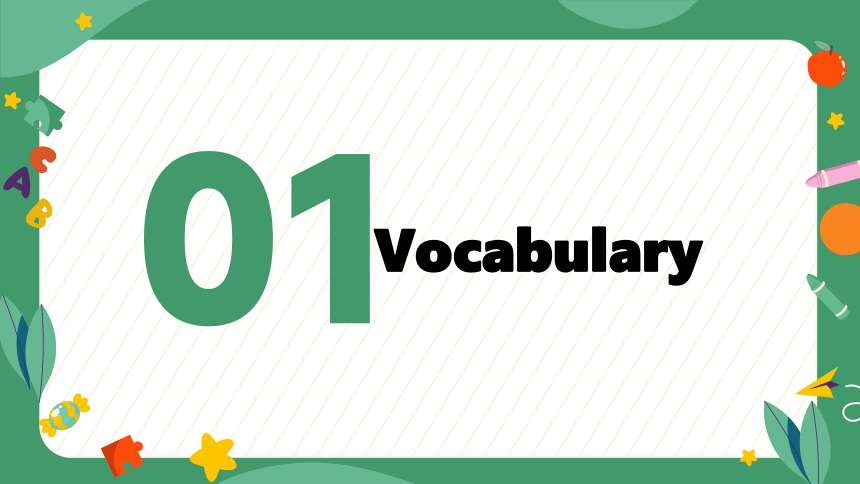
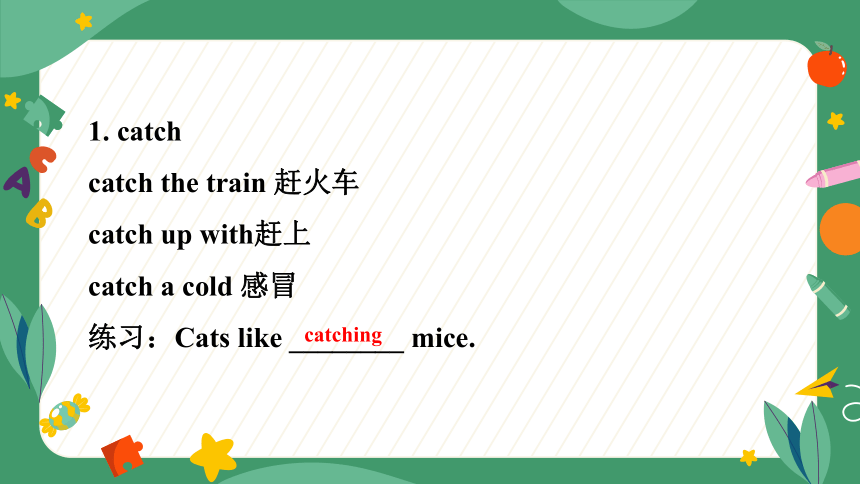
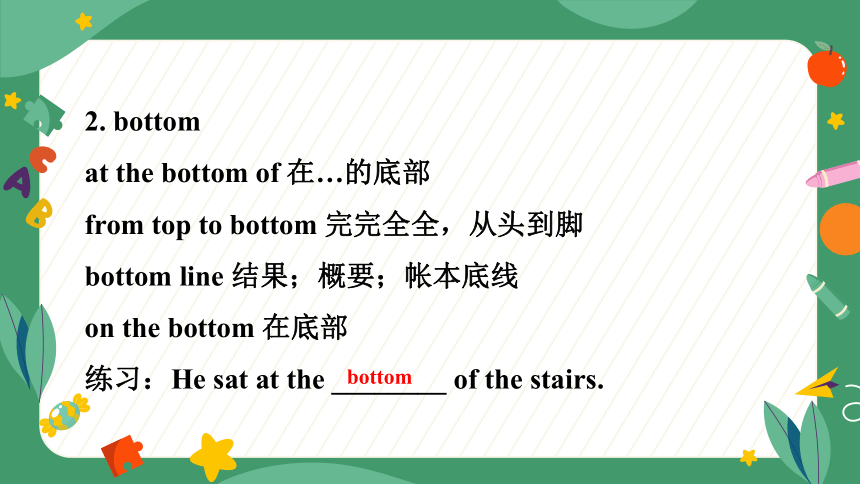
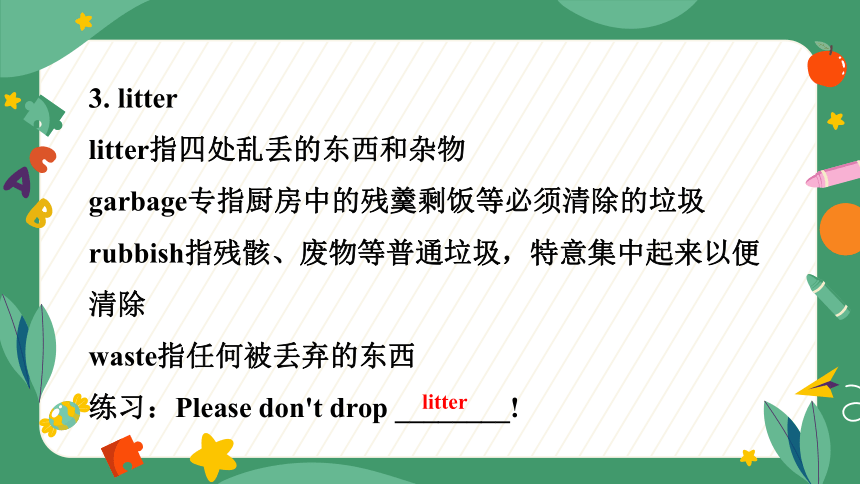
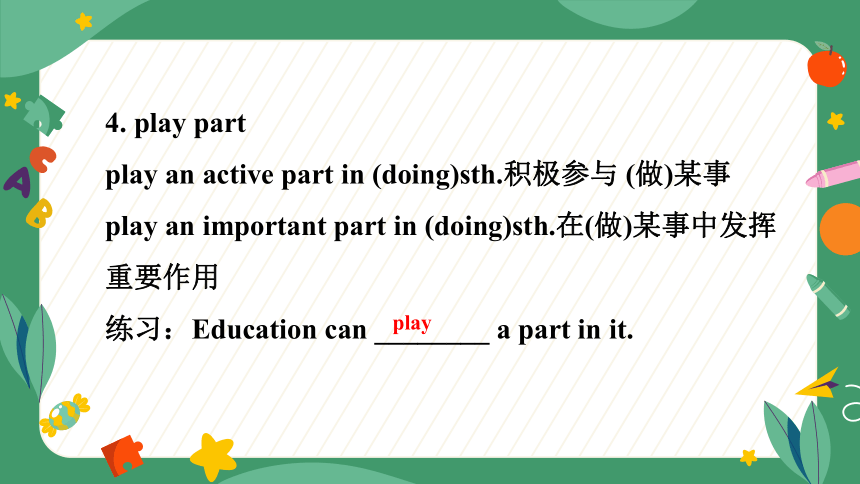
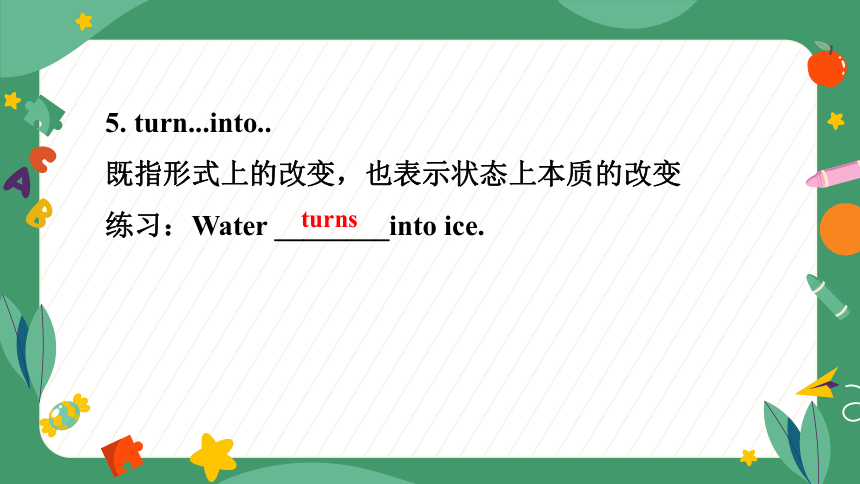
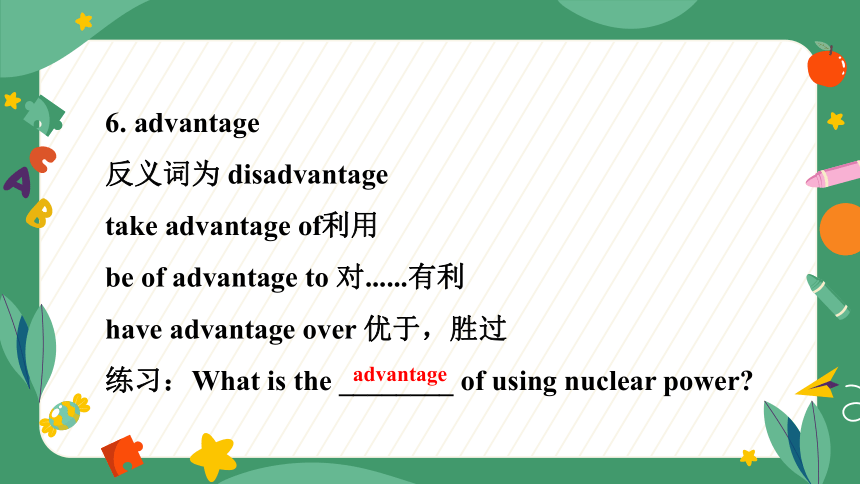
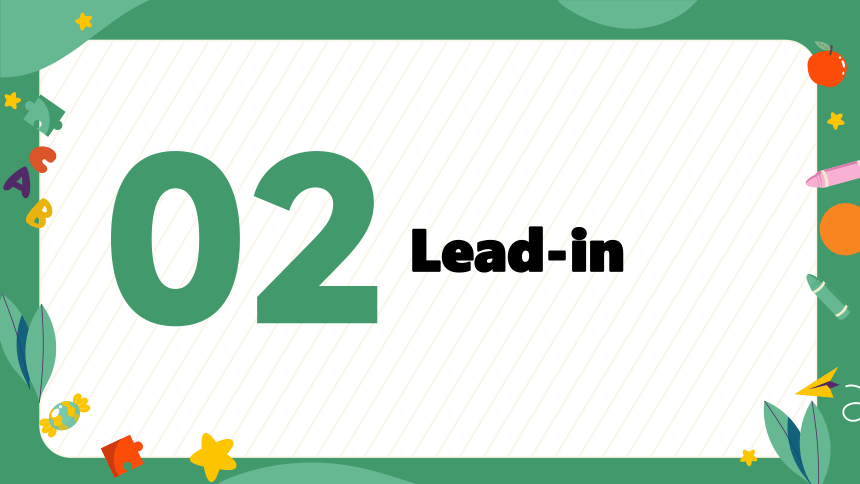
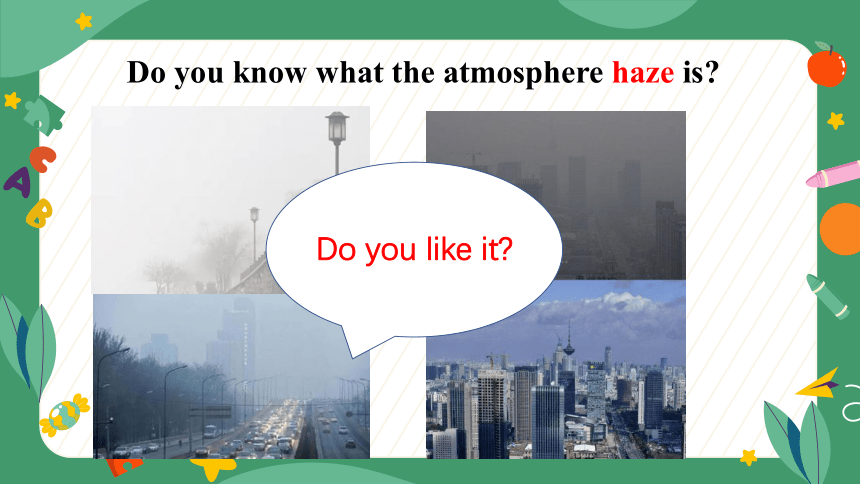
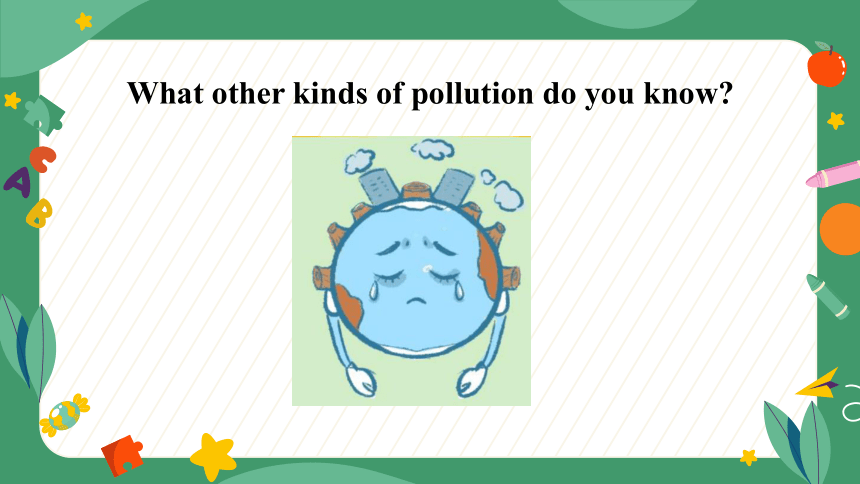
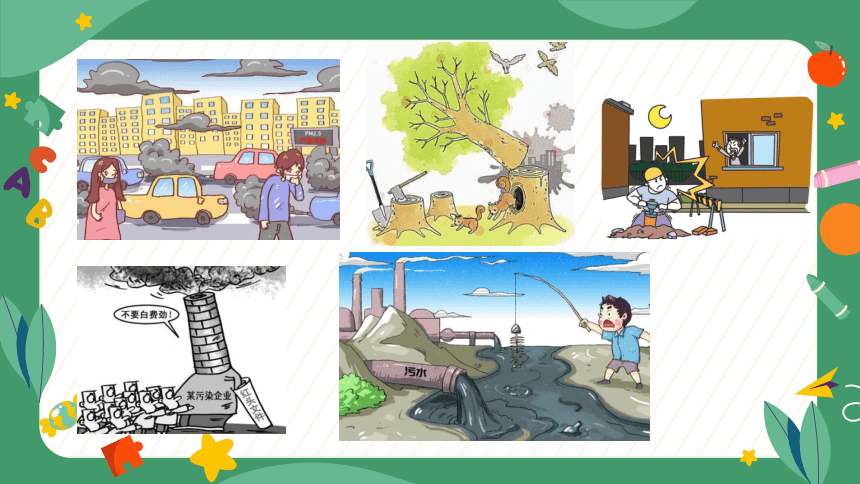
文档简介
(共57张PPT)
Section A
Unit 13
We're trying
to save the earth!
Vocabulary
01
1. catch
catch the train 赶火车
catch up with赶上
catch a cold 感冒
练习:Cats like ________ mice.
catching
2. bottom
at the bottom of 在…的底部
from top to bottom 完完全全,从头到脚
bottom line 结果;概要;帐本底线
on the bottom 在底部
练习:He sat at the ________ of the stairs.
bottom
3. litter
litter指四处乱丢的东西和杂物
garbage专指厨房中的残羹剩饭等必须清除的垃圾
rubbish指残骸、废物等普通垃圾,特意集中起来以便清除
waste指任何被丢弃的东西
练习:Please don't drop ________!
litter
4. play part
play an active part in (doing)sth.积极参与 (做)某事
play an important part in (doing)sth.在(做)某事中发挥重要作用
练习:Education can ________ a part in it.
play
5. turn...into..
既指形式上的改变,也表示状态上本质的改变
练习:Water ________into ice.
turns
6. advantage
反义词为 disadvantage
take advantage of利用
be of advantage to 对......有利
have advantage over 优于,胜过
练习:What is the ________ of using nuclear power
advantage
Lead-in
02
Do you know what the atmosphere haze is
Do you like it
What other kinds of pollution do you know
1a
Here are some words related to different kinds of pollution.
Write them in the box below. Then add more words.
loud music cars rubbish planes
littering ships factories smoking
bulding houses mobile phones air pollution
noise pullotion
water pollution
cars, factories, smoking, building houses(burning, power plants, nuclear waste disposal) Loud music, planes, building houses, mobile phones(machines, crowds, vihicles) rubbish, littering, ships, factories(sewage, industrial waste, pesticides)
1b
Listen and complete the sentences.
What was the problem The river was _____________. Even the bottom of the river was full of _________. There were no more ________ for fishermen to catch.
What caused the problem People are throwing ____ into the river.
Factories are putting _____ into the river.
How should the problem be solved We should write to the _____________ and ask them to __________ the factories. Everyone should help to ________ the river.
really dirty
rubbish
fish
litter
waste
government
close down
clean up
1c
Role-play the conversation. Then make your own conversations about the kinds of pollution in 1a.
Mark: The river was dirty. Even the bottom of
the river was full of rubbish.
Tony: But it used to be so clean!
Mark: Yes, but people are littering in the
river.
Tony: Everyone in this town should play a
part in cleaning it up!
2a
Listen to the interview. Circle the kinds of pollution that Jason and Susan talk about.
A. land pollution B. air pollution
C. noise pollution D. water pollution
2b
Listen again and complete the sentences.
1. The air is badly polluted because there are ___________ on the road these days.
2. Factories that burn coal also ________ the air with a lot of black smoke.
more cars
pollute
3. There is also too much rubbish and waste. People _________________ things every day.
4. People are also littering in ____________ like parks. This is turning beautiful places into ugly ones.
are throwing away
public places
2c
Use the information in 2a and 2b to role-play conversations between Jason and Susan.
The air has become really polluted around here. I’m getting very worried.
Yes, I used to be able to see stars in the sky.
The problem is that…
2d
Role-play the conversation.
Interviewer: Jason and Susan, what are your ideas for solving these problems
Jason: Well, to cut down air pollution, we should take the bus or subway instead of driving.
Susan: Yeah, or ride a bike. There are other advantages of bike riding. It’s good for health and it doesn’t cost anything!
Interviewer: Great ideas! What about waste pollution
Susan: Mmm, I think simple things like bringing a bag to go shopping can help. I started doing that a year ago.
Jason: Me, too. Also, I never take wooden
chopsticks or plastic forks when I buy takeaway food. I use the ones at home.
Susan: And remember to throw rubbish in the bins and keep public places clean and beautiful for everyone.
Interviewer: So together, our actions can make a difference and lead to a better future!
Read and finish the task.
List the ways to cut down air pollution
List the ways to cut down waste pollution
take the bus
take the subway
ride a bike
bring a bag to go shopping
never use wooden chopsticks or plastic forks
throw rubbish in the bins
Language points
1.Even the bottom of the river was full of ... 甚至河底都堆满了……
bottom 名词,意为“底部;最下部”,由其构成的常用短语为 at the bottom of“在……的底部”。
e.g. He fell to the bottom of the stairs. 他摔到了楼梯底下。
The answer is at the bottom of the page. 答案就在这一页的下端。
2.Everyone in this town should play a part in cleaning it up!
这个镇上的每个人都应该参与清理河流!
play a part in 意为“参与……;在……方面起作用”,相当于 play a role in,后跟名词、代词或动词-ing 形式。
e.g. He didn’t play a part in the competition at all.
他根本就没参加这次比赛。
Did you play a part in fighting? 你参与打架了吗?
3. We should take the bus or subway instead of driving.
instead of 意为“代替,而不是”,后面常跟名词、代词或动词-ing形式。
instead of doing sth. 代替做某事
例句:她没有待在家里而是去上学了。
She went to school instead of staying at home.
4. Our actions can make a difference and lead to
a better future!
make a difference 起作用;有影响
make a difference to ... 对……产生影响
注意:difference前面可加修饰语,如big, great等,表示受影响的程度。
5.There are other advantages of bike riding. 骑自行车还有其他的优点。
advantage 名词,意为“优点;有利条件”。其反义词为 disadvantage “缺点;不利条件”。
e.g. This machine has many advantages. 这台机器有许多优点。
He has the advantage of a good education.
他具有受过良好教育的优势。
Before making your decision, you should consider the advantages and disadvantages. 在做出决定之前,你应该权衡一下利弊。
6.Also, I never take wooden chopsticks or plastic forks when I buy takeaway food. 还有,当我买外卖食物时我从来不拿木筷或塑料叉。
(2)takeaway 可数名词,意为“外卖食物”,复数形式是 takeaways。
e.g. If you can’t cook, takeaways are fine.
如果你不会做饭,(吃)外卖食物就很好。
take away 意为“拿走”,为“动词+副词”型短语,名词作宾语时,放在短语中间或后面均可;代词作宾语时只能放在短语中间。
e.g. The food smells terrible. Take it away.
这食物很难闻,把它拿走。
What do you know about sharks
Have you ever heard about shark fin soup
The process of making shark fin is very cruel
Match the main ideas of each paragraph.
Talk about shark fin soup.
Sharks are endangered now.
Appeal to people against eating shark fins.
Para. 3
Para. 1
Para. 2
Read Para 1 and make T for true or F for false.
( )1. Shark fin soup is famous and expensive all around the world.
( ) 2. You’re killing a whole shark when you enjoy a bowl of shark fin soup.
F
T
Retell the passage according to the words below.
Some people like to eat shark’s fin soup, especially in __________ China. But getting the shark’s fin is very__________ .When people catch sharks, they __________ ________ their fins and throw the sharks back into the ocean. The shark slowly dies because it can’t_________ without a fin. And it is also __________to the environment. Sharks are at the _____of the food chain. If the number of sharks drops too low, it will break the balance (平衡)of the nature. Please say no to eating shark fin soup,and take actions to save the sharks!
southern
cruel
cut off
swim
harmful
top
Read Para 2 and fill the blanks.
Number of sharks caught and traded every year
How much the numbers of some kinds of sharks have fallen in the last 20 to 30 years
70 million
Over 90 percent
Read Paragraph 3 and answer the questions.
1. What are the two environmental protection groups doing to protect the sharks And what have they done
a. They are teaching the public about “finning”.
b. They have even asked governments to develop
laws to stop the sale of shark fins.
2. Are shark fins good for health Why
No, they aren’t. Because no scientific studies have shown that sharks are good for health.
3a
Read the passage about sharks and complete the fact sheet below.
Where shark fin soup is popular
Number of sharks caught and traded every year
How much the numbers of some kinds of sharks have fallen in the last 20 to 30 years
Two environmental groups against "finning"
in southern China
70 million
over 90 percent
WildAid and the WWF
3b
Read the passage again and fill in the blanks with the words in the box.
so although if but when
1. Many people do not realize they are killing a
whole shark _____ they enjoy a bowl of shark
fin soup.
2. Sharks are at the top of the food chain, ______
if their numbers drop, the ocean's ecosystem
will be in danger.
when
so
Many think that sharks are too strong to be
endangered, _________ they are wrong.
_________ there are no scientific studies to support this, a lot of people believe that shark fins are good for health.
5. Sharks may disappear one day ______ we do not do something to stop the sale of shark fins.
but
Although
if
Grammar Focus
现在进行时
1、现在进行时用来表示现在正在进行的动作
例:-What are the boys doing on the mountain 这些男孩儿正在山上做什么
-They are planting trees.他们在植树
2、表示现阶段正在进行的动作或持续的状态,这一动作不一定在说话人说话时发生
例: This term he is trying to improve his spoken English.
这学期,他正努力提高他的英语口语水平
3、go,come,leave,start,arrive 等动词用现在进行时表示即将发生的动作
例: We are leaving tomorrow. 我们明天就要走了
4、现在进行时与 always 连用表示赞扬、厌烦等语气
例: You're always interrupting me!你总是打断我的话!(抱怨)
5、get, become, turn, run, go, begin, forget, die, finish 它们的现在进行时表示将来,有逐渐、越来越或快要的意味
二、现在完成时
现在完成时由“have/has+及物动词的过去分词”构成。过去分词的构成分规则变化和不规则变化两种。规则变化的动词的过去分词和过去式的构成一样;不规则变化的动词的过去分词需特别记忆。
1、表示过去发生的动作对现在造成的影响或结果,常用非延续性动词,如begin,give,go,meet see 等,但不能与 for,since 引导的延续性的时间状语连用(在否定句中不受此限制)
例:-Have you had your lunch yet 你吃过午饭了吗
Yes, I have. I've just had it.是的,我刚刚吃过
have already met these foreign guests at the station.
我已经在车站见过这些外国客人了
2、表示从过去某时开始一直延续到现在的动作或状态。
通常用延续性动词,如 be work, study live等,常与表示时间长度的状语连用,如for two days, since 1998,all day等。
例: He has been away for a long time.他已经离开好长时间了
I have kept the book since last month.自从上个月我就借这本书了
3、 have/has been to 和have/has gone to 的区别
have/has been to曾经去过某地;
have/has gone to去了某地(现在不在这里)指已经到达某地或在去某地的路上。
例:-Have you ever been to the Great Wall 你去过长城吗
-Yes, I've been there twice.是的,我去过那儿两次
Where are Daming and Lingling 大明和玲玲在哪儿
They have gone to the library.他们去图书馆了
4、一般过去时与现在完成时在时间状语上的区别
般过去时可以和表示过去的时间状语连用,如yesterday, last month, three days ago,in 1990等;现在完成时不能与它们连用,但可以和不确定的含有“过去”之意的时间状语连用,如 before, in the past few years, in recent years等
例: Last year great changes took place in the village
去年,这个村子发生了巨大的变化。
Great changes have taken place in my hometown in the past few years
在过去的几年里,我的家乡发生了巨大的变化。
三、被动语态
1、被动语态的构成
被动语态的基本结构: be+及物动词的过去分词
2、被动语态的用法
(1)当我们不知道谁是动作的执行者,或者没有必要指出谁是动作的执行者时
例: This kind of book is sold in the bookstore near our school
这种书在我们学校附近的书店出售。
(2)有动作的执行者,但需要强调动作的承受者时
例:English is spoken by people all over the world.全世界的人都说英语
(3)动作的执行者不是人时
例:The tree was hit by a car.这棵树被车撞了
(4)在上下文中,为了使句子间连接紧密时
例: I have a new motorbike. It was given to me as a birthday present by my father.
我有辆新摩托车。它是父亲送给我作为生日礼物的.
(5)在新闻报道中,为了表明报道的客观性而避免主观性时
例: A car accident happened on the highway this morning. Three men were killed, the wounded were taken away to hospital at once and policemen were sent there to cope with the event.今天早晨高速公路上发生了一起车祸,三人丧生,伤员马上被送往了医院,警察被立即派去处理这一事件。
(6)在科技论文中,强调客观事实时
例: When it is cold enough, water will be turned into ice
当天气足够冷时,水将变成冰
(7)有些习惯用法常以被动语态形式出现
例: We should be devoted to what we do.我们应致力于我们所做的 (工作)。
3、不用被动语态的六种情况
(1)不及物动词没有动作的承受者,不能用被动结构
例:那儿发生了什么事
[正]What has happened over there
[误]What has been happened over there
(2) 连系动词 seem,be,become,feel,taste,look 等不能用于被动语态
例:这种食物尝起来很可口。
[正]The food tastes delicious.
[误]The food is tasted delicious
(3)宾语为动词不定式、动词-ing形式或从句,表示主语的一些想法、爱好或愿望时,一般不用被动语态
例:I want to buy a computer. 我想买一台电脑。
(4)宾语是相互代词、反身代词、同源宾语等时,一般不用被动语态
例:We should help each other. 我们应该互相帮助。
He thinks of himself too much.他过多地考虑自己
We live a happy life here. 我们在这儿过着幸福的生活
(5)宾语表示处所、地点时,一般不用被动语态
例: He has gone to London.他已经去了伦敦
(6)谓语部分(动词与宾语)是一个不可分割的动词短语时,一般不用被动语态
例: He saw the doctor yesterday evening.他昨天晚上看了医生
1.Your father ________. Don’t make too much noise.
A.will sleep B.is sleeping C.was sleeping D.have slept
2.Hurry up. The train ________ in twenty minutes.
A.leaves B.has left C.is leaving D.has been away
3.Speak louder, please! I can’t hear you. I ________ to a concert in the music hall.
A.will listen B.am listening C.listened D.was listening
4.—Mom, I don’t want to wear that coat today.
—But your nose is ________, Lucy! You may catch a cold.
A.riding B.running C.showing D.brushing
5.Lily, we don’t need to go back. I ________ off all the lights.
A.turn B.will turn C.am turning D.have turned
6.I don’t want to waste time, for I ________that film before.
A.see B.have seen C.will see D.was seeing
7.I ________ almost all the pages of this book, so I can return it in a minute.
A.read B.will read C.have read D.was reading
8.—Your dress is so beautiful! When did you buy it
—On my 12th birthday. I ________ it for 3 years.
A.bought B.have had C.have bought
9.A lot of birds ________ in nature parks every year.
A.protect B.are protected C.will be protected D.protected
10.Just as we know, most of the rice ________ in the south of our country.
A.grew B.is grown C.was grown D.has grown
4a
Fill in the blanks with the correct forms of the verbs in brackets.
Joe: _____ you ever ______ (take) part in
an environmental project
Ken: Yes, I have. I ______ (help) with a
Clean-Up Day last year. It was
__________ (consider) the biggest
clean-up project this city ____ ever
____ (have).
Joe: How many people ____ (take) part
Ken: I _____ (think) more than 1,000
people ______ (come) to help out.
Joe: That’s fantastic! I guess everyone in
this city is ______ (try) to improve
the environment.
Ken: Yes, we can't afford to ____ (wait)
any longer to take action!
4b
Fill in the blanks with the appropriate
modal verbs from the box.
can would could have to should must may/ might
People __________ think that big things
______ be done to save the earth. Many
forget that saving the earth begins with
small things. For example, you ____ save
electricity by turning off the lights when
you leave a room. You ______ also use
reusable bags instead of plastic bags. I think it's a great idea that you now ______ pay for plastic bags in some stores. And instead of driving to school or work, you __________ ride your bike or walk. If it's far, you __________ take the bus. All these
small things ______ add up and become big things that _________ improve the environment. Let's take action now!
4c
Make a list of things that people can do to help the environment and discuss your list with your partner.
use public transportation (n.交通运输);
turn off the lights when you leave a room;
use reusable bags instead of plastic bags;
ride your bike or walk to school or work;
stop using paper napkins
recycle books and paper
Thank you!
Section A
Unit 13
We're trying
to save the earth!
Vocabulary
01
1. catch
catch the train 赶火车
catch up with赶上
catch a cold 感冒
练习:Cats like ________ mice.
catching
2. bottom
at the bottom of 在…的底部
from top to bottom 完完全全,从头到脚
bottom line 结果;概要;帐本底线
on the bottom 在底部
练习:He sat at the ________ of the stairs.
bottom
3. litter
litter指四处乱丢的东西和杂物
garbage专指厨房中的残羹剩饭等必须清除的垃圾
rubbish指残骸、废物等普通垃圾,特意集中起来以便清除
waste指任何被丢弃的东西
练习:Please don't drop ________!
litter
4. play part
play an active part in (doing)sth.积极参与 (做)某事
play an important part in (doing)sth.在(做)某事中发挥重要作用
练习:Education can ________ a part in it.
play
5. turn...into..
既指形式上的改变,也表示状态上本质的改变
练习:Water ________into ice.
turns
6. advantage
反义词为 disadvantage
take advantage of利用
be of advantage to 对......有利
have advantage over 优于,胜过
练习:What is the ________ of using nuclear power
advantage
Lead-in
02
Do you know what the atmosphere haze is
Do you like it
What other kinds of pollution do you know
1a
Here are some words related to different kinds of pollution.
Write them in the box below. Then add more words.
loud music cars rubbish planes
littering ships factories smoking
bulding houses mobile phones air pollution
noise pullotion
water pollution
cars, factories, smoking, building houses(burning, power plants, nuclear waste disposal) Loud music, planes, building houses, mobile phones(machines, crowds, vihicles) rubbish, littering, ships, factories(sewage, industrial waste, pesticides)
1b
Listen and complete the sentences.
What was the problem The river was _____________. Even the bottom of the river was full of _________. There were no more ________ for fishermen to catch.
What caused the problem People are throwing ____ into the river.
Factories are putting _____ into the river.
How should the problem be solved We should write to the _____________ and ask them to __________ the factories. Everyone should help to ________ the river.
really dirty
rubbish
fish
litter
waste
government
close down
clean up
1c
Role-play the conversation. Then make your own conversations about the kinds of pollution in 1a.
Mark: The river was dirty. Even the bottom of
the river was full of rubbish.
Tony: But it used to be so clean!
Mark: Yes, but people are littering in the
river.
Tony: Everyone in this town should play a
part in cleaning it up!
2a
Listen to the interview. Circle the kinds of pollution that Jason and Susan talk about.
A. land pollution B. air pollution
C. noise pollution D. water pollution
2b
Listen again and complete the sentences.
1. The air is badly polluted because there are ___________ on the road these days.
2. Factories that burn coal also ________ the air with a lot of black smoke.
more cars
pollute
3. There is also too much rubbish and waste. People _________________ things every day.
4. People are also littering in ____________ like parks. This is turning beautiful places into ugly ones.
are throwing away
public places
2c
Use the information in 2a and 2b to role-play conversations between Jason and Susan.
The air has become really polluted around here. I’m getting very worried.
Yes, I used to be able to see stars in the sky.
The problem is that…
2d
Role-play the conversation.
Interviewer: Jason and Susan, what are your ideas for solving these problems
Jason: Well, to cut down air pollution, we should take the bus or subway instead of driving.
Susan: Yeah, or ride a bike. There are other advantages of bike riding. It’s good for health and it doesn’t cost anything!
Interviewer: Great ideas! What about waste pollution
Susan: Mmm, I think simple things like bringing a bag to go shopping can help. I started doing that a year ago.
Jason: Me, too. Also, I never take wooden
chopsticks or plastic forks when I buy takeaway food. I use the ones at home.
Susan: And remember to throw rubbish in the bins and keep public places clean and beautiful for everyone.
Interviewer: So together, our actions can make a difference and lead to a better future!
Read and finish the task.
List the ways to cut down air pollution
List the ways to cut down waste pollution
take the bus
take the subway
ride a bike
bring a bag to go shopping
never use wooden chopsticks or plastic forks
throw rubbish in the bins
Language points
1.Even the bottom of the river was full of ... 甚至河底都堆满了……
bottom 名词,意为“底部;最下部”,由其构成的常用短语为 at the bottom of“在……的底部”。
e.g. He fell to the bottom of the stairs. 他摔到了楼梯底下。
The answer is at the bottom of the page. 答案就在这一页的下端。
2.Everyone in this town should play a part in cleaning it up!
这个镇上的每个人都应该参与清理河流!
play a part in 意为“参与……;在……方面起作用”,相当于 play a role in,后跟名词、代词或动词-ing 形式。
e.g. He didn’t play a part in the competition at all.
他根本就没参加这次比赛。
Did you play a part in fighting? 你参与打架了吗?
3. We should take the bus or subway instead of driving.
instead of 意为“代替,而不是”,后面常跟名词、代词或动词-ing形式。
instead of doing sth. 代替做某事
例句:她没有待在家里而是去上学了。
She went to school instead of staying at home.
4. Our actions can make a difference and lead to
a better future!
make a difference 起作用;有影响
make a difference to ... 对……产生影响
注意:difference前面可加修饰语,如big, great等,表示受影响的程度。
5.There are other advantages of bike riding. 骑自行车还有其他的优点。
advantage 名词,意为“优点;有利条件”。其反义词为 disadvantage “缺点;不利条件”。
e.g. This machine has many advantages. 这台机器有许多优点。
He has the advantage of a good education.
他具有受过良好教育的优势。
Before making your decision, you should consider the advantages and disadvantages. 在做出决定之前,你应该权衡一下利弊。
6.Also, I never take wooden chopsticks or plastic forks when I buy takeaway food. 还有,当我买外卖食物时我从来不拿木筷或塑料叉。
(2)takeaway 可数名词,意为“外卖食物”,复数形式是 takeaways。
e.g. If you can’t cook, takeaways are fine.
如果你不会做饭,(吃)外卖食物就很好。
take away 意为“拿走”,为“动词+副词”型短语,名词作宾语时,放在短语中间或后面均可;代词作宾语时只能放在短语中间。
e.g. The food smells terrible. Take it away.
这食物很难闻,把它拿走。
What do you know about sharks
Have you ever heard about shark fin soup
The process of making shark fin is very cruel
Match the main ideas of each paragraph.
Talk about shark fin soup.
Sharks are endangered now.
Appeal to people against eating shark fins.
Para. 3
Para. 1
Para. 2
Read Para 1 and make T for true or F for false.
( )1. Shark fin soup is famous and expensive all around the world.
( ) 2. You’re killing a whole shark when you enjoy a bowl of shark fin soup.
F
T
Retell the passage according to the words below.
Some people like to eat shark’s fin soup, especially in __________ China. But getting the shark’s fin is very__________ .When people catch sharks, they __________ ________ their fins and throw the sharks back into the ocean. The shark slowly dies because it can’t_________ without a fin. And it is also __________to the environment. Sharks are at the _____of the food chain. If the number of sharks drops too low, it will break the balance (平衡)of the nature. Please say no to eating shark fin soup,and take actions to save the sharks!
southern
cruel
cut off
swim
harmful
top
Read Para 2 and fill the blanks.
Number of sharks caught and traded every year
How much the numbers of some kinds of sharks have fallen in the last 20 to 30 years
70 million
Over 90 percent
Read Paragraph 3 and answer the questions.
1. What are the two environmental protection groups doing to protect the sharks And what have they done
a. They are teaching the public about “finning”.
b. They have even asked governments to develop
laws to stop the sale of shark fins.
2. Are shark fins good for health Why
No, they aren’t. Because no scientific studies have shown that sharks are good for health.
3a
Read the passage about sharks and complete the fact sheet below.
Where shark fin soup is popular
Number of sharks caught and traded every year
How much the numbers of some kinds of sharks have fallen in the last 20 to 30 years
Two environmental groups against "finning"
in southern China
70 million
over 90 percent
WildAid and the WWF
3b
Read the passage again and fill in the blanks with the words in the box.
so although if but when
1. Many people do not realize they are killing a
whole shark _____ they enjoy a bowl of shark
fin soup.
2. Sharks are at the top of the food chain, ______
if their numbers drop, the ocean's ecosystem
will be in danger.
when
so
Many think that sharks are too strong to be
endangered, _________ they are wrong.
_________ there are no scientific studies to support this, a lot of people believe that shark fins are good for health.
5. Sharks may disappear one day ______ we do not do something to stop the sale of shark fins.
but
Although
if
Grammar Focus
现在进行时
1、现在进行时用来表示现在正在进行的动作
例:-What are the boys doing on the mountain 这些男孩儿正在山上做什么
-They are planting trees.他们在植树
2、表示现阶段正在进行的动作或持续的状态,这一动作不一定在说话人说话时发生
例: This term he is trying to improve his spoken English.
这学期,他正努力提高他的英语口语水平
3、go,come,leave,start,arrive 等动词用现在进行时表示即将发生的动作
例: We are leaving tomorrow. 我们明天就要走了
4、现在进行时与 always 连用表示赞扬、厌烦等语气
例: You're always interrupting me!你总是打断我的话!(抱怨)
5、get, become, turn, run, go, begin, forget, die, finish 它们的现在进行时表示将来,有逐渐、越来越或快要的意味
二、现在完成时
现在完成时由“have/has+及物动词的过去分词”构成。过去分词的构成分规则变化和不规则变化两种。规则变化的动词的过去分词和过去式的构成一样;不规则变化的动词的过去分词需特别记忆。
1、表示过去发生的动作对现在造成的影响或结果,常用非延续性动词,如begin,give,go,meet see 等,但不能与 for,since 引导的延续性的时间状语连用(在否定句中不受此限制)
例:-Have you had your lunch yet 你吃过午饭了吗
Yes, I have. I've just had it.是的,我刚刚吃过
have already met these foreign guests at the station.
我已经在车站见过这些外国客人了
2、表示从过去某时开始一直延续到现在的动作或状态。
通常用延续性动词,如 be work, study live等,常与表示时间长度的状语连用,如for two days, since 1998,all day等。
例: He has been away for a long time.他已经离开好长时间了
I have kept the book since last month.自从上个月我就借这本书了
3、 have/has been to 和have/has gone to 的区别
have/has been to曾经去过某地;
have/has gone to去了某地(现在不在这里)指已经到达某地或在去某地的路上。
例:-Have you ever been to the Great Wall 你去过长城吗
-Yes, I've been there twice.是的,我去过那儿两次
Where are Daming and Lingling 大明和玲玲在哪儿
They have gone to the library.他们去图书馆了
4、一般过去时与现在完成时在时间状语上的区别
般过去时可以和表示过去的时间状语连用,如yesterday, last month, three days ago,in 1990等;现在完成时不能与它们连用,但可以和不确定的含有“过去”之意的时间状语连用,如 before, in the past few years, in recent years等
例: Last year great changes took place in the village
去年,这个村子发生了巨大的变化。
Great changes have taken place in my hometown in the past few years
在过去的几年里,我的家乡发生了巨大的变化。
三、被动语态
1、被动语态的构成
被动语态的基本结构: be+及物动词的过去分词
2、被动语态的用法
(1)当我们不知道谁是动作的执行者,或者没有必要指出谁是动作的执行者时
例: This kind of book is sold in the bookstore near our school
这种书在我们学校附近的书店出售。
(2)有动作的执行者,但需要强调动作的承受者时
例:English is spoken by people all over the world.全世界的人都说英语
(3)动作的执行者不是人时
例:The tree was hit by a car.这棵树被车撞了
(4)在上下文中,为了使句子间连接紧密时
例: I have a new motorbike. It was given to me as a birthday present by my father.
我有辆新摩托车。它是父亲送给我作为生日礼物的.
(5)在新闻报道中,为了表明报道的客观性而避免主观性时
例: A car accident happened on the highway this morning. Three men were killed, the wounded were taken away to hospital at once and policemen were sent there to cope with the event.今天早晨高速公路上发生了一起车祸,三人丧生,伤员马上被送往了医院,警察被立即派去处理这一事件。
(6)在科技论文中,强调客观事实时
例: When it is cold enough, water will be turned into ice
当天气足够冷时,水将变成冰
(7)有些习惯用法常以被动语态形式出现
例: We should be devoted to what we do.我们应致力于我们所做的 (工作)。
3、不用被动语态的六种情况
(1)不及物动词没有动作的承受者,不能用被动结构
例:那儿发生了什么事
[正]What has happened over there
[误]What has been happened over there
(2) 连系动词 seem,be,become,feel,taste,look 等不能用于被动语态
例:这种食物尝起来很可口。
[正]The food tastes delicious.
[误]The food is tasted delicious
(3)宾语为动词不定式、动词-ing形式或从句,表示主语的一些想法、爱好或愿望时,一般不用被动语态
例:I want to buy a computer. 我想买一台电脑。
(4)宾语是相互代词、反身代词、同源宾语等时,一般不用被动语态
例:We should help each other. 我们应该互相帮助。
He thinks of himself too much.他过多地考虑自己
We live a happy life here. 我们在这儿过着幸福的生活
(5)宾语表示处所、地点时,一般不用被动语态
例: He has gone to London.他已经去了伦敦
(6)谓语部分(动词与宾语)是一个不可分割的动词短语时,一般不用被动语态
例: He saw the doctor yesterday evening.他昨天晚上看了医生
1.Your father ________. Don’t make too much noise.
A.will sleep B.is sleeping C.was sleeping D.have slept
2.Hurry up. The train ________ in twenty minutes.
A.leaves B.has left C.is leaving D.has been away
3.Speak louder, please! I can’t hear you. I ________ to a concert in the music hall.
A.will listen B.am listening C.listened D.was listening
4.—Mom, I don’t want to wear that coat today.
—But your nose is ________, Lucy! You may catch a cold.
A.riding B.running C.showing D.brushing
5.Lily, we don’t need to go back. I ________ off all the lights.
A.turn B.will turn C.am turning D.have turned
6.I don’t want to waste time, for I ________that film before.
A.see B.have seen C.will see D.was seeing
7.I ________ almost all the pages of this book, so I can return it in a minute.
A.read B.will read C.have read D.was reading
8.—Your dress is so beautiful! When did you buy it
—On my 12th birthday. I ________ it for 3 years.
A.bought B.have had C.have bought
9.A lot of birds ________ in nature parks every year.
A.protect B.are protected C.will be protected D.protected
10.Just as we know, most of the rice ________ in the south of our country.
A.grew B.is grown C.was grown D.has grown
4a
Fill in the blanks with the correct forms of the verbs in brackets.
Joe: _____ you ever ______ (take) part in
an environmental project
Ken: Yes, I have. I ______ (help) with a
Clean-Up Day last year. It was
__________ (consider) the biggest
clean-up project this city ____ ever
____ (have).
Joe: How many people ____ (take) part
Ken: I _____ (think) more than 1,000
people ______ (come) to help out.
Joe: That’s fantastic! I guess everyone in
this city is ______ (try) to improve
the environment.
Ken: Yes, we can't afford to ____ (wait)
any longer to take action!
4b
Fill in the blanks with the appropriate
modal verbs from the box.
can would could have to should must may/ might
People __________ think that big things
______ be done to save the earth. Many
forget that saving the earth begins with
small things. For example, you ____ save
electricity by turning off the lights when
you leave a room. You ______ also use
reusable bags instead of plastic bags. I think it's a great idea that you now ______ pay for plastic bags in some stores. And instead of driving to school or work, you __________ ride your bike or walk. If it's far, you __________ take the bus. All these
small things ______ add up and become big things that _________ improve the environment. Let's take action now!
4c
Make a list of things that people can do to help the environment and discuss your list with your partner.
use public transportation (n.交通运输);
turn off the lights when you leave a room;
use reusable bags instead of plastic bags;
ride your bike or walk to school or work;
stop using paper napkins
recycle books and paper
Thank you!
同课章节目录
- Unit 1 How can we become good learners.
- Section A
- Section B
- Unit 2 I think that mooncakes are delicious!
- Section A
- Section B
- Unit 3 Could you please tell me where the restroom
- Section A
- Section B
- Unit 4 I used to be afraid of the dark.
- Section A
- Section B
- Unit 5 What are the shirts made of?
- Section A
- Section B
- Review of Units 1-5
- Unit 6 When was it invented?
- Section A
- Section B
- Unit 7 Teenagers should be allowed to choose their
- Section A
- Section B
- Unit 8 It must belong to Carla.
- Section A
- Section B
- Unit 9 I like music that I can dance to.
- Section A
- Section B
- Unit 10 You're supposed to shake hands.
- Section A
- Section B
- Review of Units 6-10
- Unit 11 Sad movies make me cry.
- Section A
- Section B
- Unit 12 Life is full of the unexpected
- Section A
- Section B
- Unit 13 We're trying to save the earth!
- Section A
- Section B
- Unit 14 I remember meeting all of you in Grade 7.
- Section A
- Section B
- Review of Units 11-14
